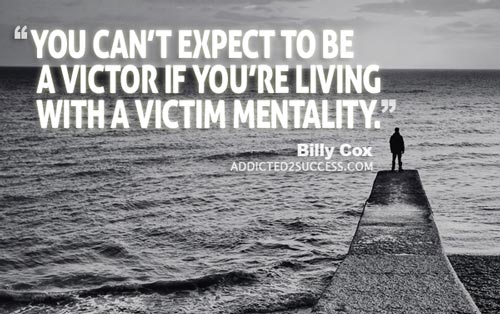Life
Are You A Victor or Victim? 12 Signs You Have The Victim Mentality

When was the last time you spent a day or two being the victim? Was it that you wanted something, and it just didn’t go your way or did someone hurt your feelings?
If that’s you, do not even start feeling bad about it. We are all guilty of playing the victim at some point in our lives.
You like most of us react the same way when our feelings get hurt. You feel insulted, disrespected, abandoned, humiliated just to name a few of the emotions you experience.
You are human, and human beings will feel those emotions but how long do they last? Do you hang on to these emotions for lengthy periods of time? Do you tend to wallow in self-pity for days? Do you think the whole world is against you? Or Do you get yourself together, realize that you made a mistake and that some things are just not under your control and immediately start working to change your future?
“Learn from your past but don’t live in it.” – Steve Maraboli
I hope you choose the latter and work on making positive changes in your life. If you don’t, I have included a few of the tips that I used to become unstuck.
Here are 12 ways to become the victor and not the victim:
1. Recognize the self-loathing stage
When you start thinking that bad things only happen to you, and you are asking yourself why me, then you are in the self-loathing stage.
Change your mindset immediately. Instead of asking yourself those questions, start thinking about what you can do to turn things around. Thoughts like those only make you feel worse about yourself. Remember you will have to fix the situation if you want to make things right, so it is better to do so immediately than to spend time attacking yourself.
Refocus your mind on things that will take you from that low. Think about the things that make you a wonderful human being. Listen to motivational speakers, read positive quotes or find something to do that will take your mind away from your problems.
2. Recognize when you start looking back at the past with regrets
When you begin to focus on the past with regrets, it means you are heading down the wrong path. Grieve for your mistakes and bury them.
You must realize that the past is behind you and never can be retrieved so you must move forward. Looking back will only delay your progress. The past is in the past for a reason, either you must continue to grow, or you need to change your focus. Dwelling on your past mistakes and feeling down and depressed will only increase your suffering and ruin your chances for future successes.
Use the mistakes of the past, not only as a reminder never to go back, but also to see how far you have come. You are over your past at this stage so applaud yourself for moving ahead. You are now stronger and wiser because of those mistakes. Learn from them and move on. Your mistakes are not who you are as a person. Separate yourself from the things you did.

3. Recognize when you are comparing your achievements to others
When you start comparing yourself to others, you view as better off you are playing the victim.
First you have to know who you are as a person. There is no one else like you on this earth, and there will never be. Even if you imitate everything they do, you will never be them, and you must accept that. Start accepting who you are and work on appreciating your gifts. Why would you want to live someone else’s life when you have yours to live?
You will never be happy being someone else so accept yourself and love who you are. Work on building your dreams and achieving your goals. Work to become the best version of yourself.
4. You aren’t happy with your success
When you start looking at your achievements and not seeing much, you are feeling sorry for yourself.
You must start celebrating your achievements no matter how small and insignificant they may seem to you. Someone else would love to be in your shoes. Do not diminish all the things you have achieved thus far as this will prevent you from appreciating anything else in the future. Be happy where you are in your life and celebrate what you have. That is exactly where you should be. Keep working harder to get where you want but in the meantime celebrate your achievements.
Happiness is a choice so choose to be happy. Work hard to achieve your goals, but choose to remain happy while doing so. Don’t delay your happiness to achieve material things because they won’t make you happy.
5. You are becoming withdrawn
If you weren’t someone who liked staying away from others and you find yourself suddenly wanting to be by yourself, then you are playing the victim.
Never abandon the relationships you have and become withdrawn when you are feeling sad. You may be sad and disappointed but remember, we all at different stages of our lives, have been disappointed and heartbroken. Abandoning your friends and family will only make things harder for you.
Make the effort to hang around positive people who will encourage and motivate you. Stay amongst people who know and support you. The ones who see the greatness in you and will encourage you.
6. You start placing blame
When you start blaming someone or something for the state you are in, then you are becoming the victim.
You must realize that you are solely responsible for your life and your achievements. It is no one else’s job to give you the life you want. Blaming others for the position you find yourself in will only prevent you from improving. You must accept responsibility for your life.
Desist from blaming others and work to find solutions to your problems. Blaming others will only create distance between you and others who could help you. Remember you cannot do it alone and placing the blame will only keep people away from you.
Accept that you have erred and work to improve your future. Remember whatever you want, you can achieve if you are prepared to work hard enough. You have your whole life ahead of you to make up for all your mistakes.
“As long as you think that the cause of your problem is “out there”—as long as you think that anyone or anything is responsible for your suffering—the situation is hopeless.” – Byron Katie
7. You see yourself as a failure
When you start seeing yourself as a failure then you know you are wallowing in being the victim.
You can never be a failure as long as you are prepared to keep fighting. You will sometimes fail like most of us have, but you must realize that failing at something doesn’t mean the end. It might simply mean you need to pause, change your strategy or work harder.
Never think of yourself as a failure because things didn’t work out this time. Keep doing it until you get it right. Remember you only fail when you give up.
8. You are not able to forgive
If you are not able to forgive all those who have hurt or harmed you including yourself, then you are in a victim mentality state.
You must be prepared to forgive those who have caused you harm not for them, but yourself. Most of the people who have done things to you might not even be aware they have caused you pain and even if they are aware, do not care. Letting go of the hurt and pain does more good for you than anyone else.
You must also forgive yourself in the process for allowing others to hurt you. You have given them your power and they have used it to hurt you. You need also to forgive yourself for your past mistakes.
When you forgive, you are giving yourself permission to be free. You are allowing yourself the freedom to grow and succeed. You are allowing yourself to live life to the fullest.
9. You have become angry and bitter
If you find that you are becoming angry and bitter, it means you are still in your victim mentality state.
No matter what happens in your life, you must make a conscious effort never to allow these things to make you angry or bitter. You will be the one to suffer because of it. You won’t enjoy life, relationships or your successes, as you will be too angry and bitter to appreciate the good things in your life.
Life knocks us all down sometimes, but you must understand that is life. You are no different nor are you special when it comes to pain, disappointment and hurt. We all have to go through hardship.
10. You stop caring about your appearance
If you find that you are no longer taking care of yourself, then you are in a self-destructive mode.
Your appearance is very important when you are going through difficult times. You cannot afford to let yourself go. Take care of yourself for you.
Find a gym or dance class if you like indoor activities and if you are more of an outdoors person start jogging or doing other outdoor activities. Choose clothes that fit properly and try not to become an emotional eater. You must make an effort to eat well. Remember you are special and that will not change because you are going through a difficult time. You will remain special through life’s ups and downs.
11. When you take rejections hard
If you find it very difficult to take rejections, it means you consider yourself a victim.
Nobody likes being rejected, but when you find that you take it too personal, then you are allowing the rejection to be who you are. A person might reject you not because they have issues with you, but because they are having problems of their own. People will critique you based on their perception of themselves. Many times that has nothing to do with you and who you are.
You must be able to differentiate between someone critiquing your work and criticizing you. You must also be able to take rejection for what it is.
“I am not a victim. No matter what I have been through, I’m still here. I have a history of victory.” – Steve Maraboli
12. You are no longer taking risks
When you find that you are no longer willing to take the necessary risks to succeed, it means you see yourself as a victim.
To succeed, you must be prepared to take the risk that will enable you to succeed. Without risk, you will not be rewarded. You cannot be afraid or lack confidence in your abilities that you are no longer willing to take the steps to achieve your goals.
Resist becoming a victim of any kind. You must understand that you are special and being a victim will only rob you of the chance to succeed.
Take care of yourself and those you love. Forgive those around you who haven’t been so kind and most of all forgive you.You do not have to become a victim ever in your life if you are prepared to remain the victor.The fact that you are still alive means you have already won. You are a victor and will forever be one so start accepting who you are.
Thank you for reading my article! Which sign is your biggest action killer?
Did You Know
How Skilled Migrants Are Building Successful Careers After Moving Countries
Behind every successful skilled migrant career is a mix of resilience, strategy, and navigating systems built for locals.

Moving to a new country for work is exciting, but it can also be unnerving. Skilled migrants leave behind familiar systems, networks, and support to pursue better job opportunities and a better future for their families. (more…)
Life
10 Research-Backed Steps to Create Real Change This New Year
This New Year could finally be the one where you break old patterns and create real, lasting change.

Every New Year, we make plans and set goals, but often repeat old patterns. (more…)
Life
9 Harsh Truths Every Young Man Must Face to Succeed in the Modern World
Before chasing success, every young man needs to face these 9 brutal realities shaping masculinity in the modern world.

Many young men today quietly battle depression, loneliness, and a sense of confusion about who they’re meant to be.
Some blame the lack of deep friendships or romantic relationships. Others feel lost in a digital world that often labels traditional masculinity as “toxic.”
But the truth is this: becoming a man in the modern age takes more than just surviving. It takes resilience, direction, and a willingness to grow even when no one’s watching.
Success doesn’t arrive by accident or luck. It’s built on discipline, sacrifice, and consistency.
Here are 9 harsh truths every young man should know if he wants to thrive, not just survive, in the digital age.
1. Never Use Your Illness as an Excuse
As Dr. Jordan B. Peterson often says, successful people don’t complain; they act.
Your illness, hardship, or struggle shouldn’t define your limits; it should define your motivation. Rest when you must, but always get back up and keep building your dreams. Motivation doesn’t appear magically. It comes after you take action.
Here are five key lessons I’ve learned from Dr. Peterson:
-
Learn to write clearly; clarity of thought makes you dangerous.
-
Read quality literature in your free time.
-
Nurture a strong relationship with your family.
-
Share your ideas publicly; your voice matters.
-
Become a “monster”, powerful, but disciplined enough to control it.
The best leaders and thinkers are grounded. They welcome criticism, adapt quickly, and keep moving forward no matter what.
2. You Can’t Please Everyone And That’s Okay
You don’t need a crowd of people to feel fulfilled. You need a few friends who genuinely accept you for who you are.
If your circle doesn’t bring out your best, it’s okay to walk away. Solitude can be a powerful teacher. It gives you space to understand what you truly want from life. Remember, successful men aren’t people-pleasers; they’re purpose-driven.
3. You Can Control the Process, Not the Outcome
Especially in creative work, writing, business, or content creation, you control effort, not results.
You might publish two articles a day, but you can’t dictate which one will go viral. Focus on mastery, not metrics. Many great writers toiled for years in obscurity before anyone noticed them. Rejection, criticism, and indifference are all part of the path.
The best creators focus on storytelling, not applause.
4. Rejection Is Never Personal
Rejection doesn’t mean you’re unworthy. It simply means your offer, idea, or timing didn’t align.
Every successful person has faced rejection repeatedly. What separates them is persistence and perspective. They see rejection as feedback, not failure. The faster you learn that truth, the faster you’ll grow.
5. Women Value Comfort and Security
Understanding women requires maturity and empathy.
Through books, lectures, and personal growth, I’ve learned that most women desire a man who is grounded, intelligent, confident, emotionally stable, and consistent. Some want humor, others intellect, but nearly all want to feel safe and supported.
Instead of chasing attention, work on self-improvement. Build competence and confidence, and the rest will follow naturally.
6. There’s No Such Thing as Failure, Only Lessons
A powerful lesson from Neuro-Linguistic Programming: failure only exists when you stop trying.
Every mistake brings data. Every setback builds wisdom. The most successful men aren’t fearless. They’ve simply learned to act despite fear.
Be proud of your scars. They’re proof you were brave enough to try.
7. Public Speaking Is an Art Form
Public speaking is one of the most valuable and underrated skills a man can master.
It’s not about perfection; it’s about connection. The best speakers tell stories, inspire confidence, and make people feel seen. They research deeply, speak honestly, and practice relentlessly.
If you can speak well, you can lead, sell, teach, and inspire. Start small, practice at work, in class, or even in front of a mirror, and watch your confidence skyrocket.
8. Teaching Is Leadership in Disguise
Great teachers are not just knowledgeable. They’re brave, compassionate, and disciplined.
Teaching forces you to articulate what you know, and in doing so, you master it at a deeper level. Whether you’re mentoring a peer, leading a team, or sharing insights online, teaching refines your purpose.
Lifelong learners become lifelong leaders.
9. Study Human Nature to Achieve Your Dreams
One of the toughest lessons to accept: most people are self-interested.
That’s not cynicism, it’s human nature. Understanding this helps you navigate relationships, business, and communication more effectively.
Everyone has a darker side, but successful people learn to channel theirs productively into discipline, creativity, and drive.
Psychology isn’t just theory; it’s a toolkit. Learn how people think, act, and decide, and you’ll know how to lead them, influence them, and even understand yourself better.
Final Thoughts
The digital age offers endless opportunities, but only to those who are willing to take responsibility, confront discomfort, and keep improving.
Becoming a man today means embracing the hard truths most avoid.
Because at the end of the day, success isn’t about luck. It’s about who you become when life tests you the most.
Change Your Mindset
The Four Types of Happiness: Which One Are You Living In?
Most people chase success only to find emptiness, this model reveals why true happiness lies somewhere else.

In a world driven by rapid technological growth and constant competition, many people unknowingly trade joy for achievement. (more…)
-

 News3 weeks ago
News3 weeks agoBrandon Willington Builds 7-Figure Business by Ignoring Almost Everything
-

 Health & Fitness4 weeks ago
Health & Fitness4 weeks agoWhat Minimalism Actually Means for Your Wellness Choices
-

 Did You Know3 weeks ago
Did You Know3 weeks agoWhy Most Online Courses Fail and How to Fix Them
-

 Business4 weeks ago
Business4 weeks agoIf Your Business Internet Keeps Letting You Down, Read This
-

 Business2 weeks ago
Business2 weeks agoEntrepreneur’s Guide to Pay Stubs: Why Freelancers and Small Business Owners Need a Smart Generator
-

 Business2 weeks ago
Business2 weeks agoThe Salary Shift Giving UK Employers An Unexpected Edge
-

 Scale Your Business2 weeks ago
Scale Your Business2 weeks ago5 Real Ways to Grow Your User Base Fast
-

 Business2 weeks ago
Business2 weeks agoThe Simple Security Stack Every Online Business Needs






























10 Comments